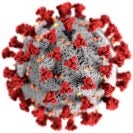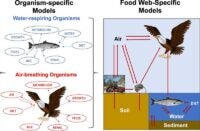In the News
 PFAS in Our Food Chain - Experts working to understand, address, and communicate the impacts of PFAS, a large group of toxic chemicals commonplace to home and work, have marked a new phase of the effort with an initiative to develop guidance so New Englanders can make informed choices about eating foods that could harbor PFAS. Wild game, fish, and shellfish are foods of focus for the group of scientists and public health specialists who came together for a multi-day workshop, “Field & Stream: Confronting PFAS in New England’s Wild and Aquatic Foods,”… ...Read more
PFAS in Our Food Chain - Experts working to understand, address, and communicate the impacts of PFAS, a large group of toxic chemicals commonplace to home and work, have marked a new phase of the effort with an initiative to develop guidance so New Englanders can make informed choices about eating foods that could harbor PFAS. Wild game, fish, and shellfish are foods of focus for the group of scientists and public health specialists who came together for a multi-day workshop, “Field & Stream: Confronting PFAS in New England’s Wild and Aquatic Foods,”… ...Read more
 New Webinar Series on PFAS & Community Solutions - This webinar series will provide community members, health professionals, and policymakers with up-to-date research, practical solutions, and an opportunity to engage directly with experts. Each one-hour webinar will include presentations and a live Q&A, with recordings available on the STEEP website for those unable to attend. ...Read more
New Webinar Series on PFAS & Community Solutions - This webinar series will provide community members, health professionals, and policymakers with up-to-date research, practical solutions, and an opportunity to engage directly with experts. Each one-hour webinar will include presentations and a live Q&A, with recordings available on the STEEP website for those unable to attend. ...Read more
 PFAS and the Pandemic: Connecting COVID-19 Deaths with PFAS in Drinking Water - A significant impact of PFAS on human health is reduced immune system response, i.e. strength. This may mean getting a cold virus more often, or maybe even a slightly more severe bout of the flu. But there’s a complicated and wide range of immune system responses that can occur from exposure to PFAS. STEEP has long focused in this specific area of study.… ...Read more
PFAS and the Pandemic: Connecting COVID-19 Deaths with PFAS in Drinking Water - A significant impact of PFAS on human health is reduced immune system response, i.e. strength. This may mean getting a cold virus more often, or maybe even a slightly more severe bout of the flu. But there’s a complicated and wide range of immune system responses that can occur from exposure to PFAS. STEEP has long focused in this specific area of study.… ...Read more
 Research Links PFOS and Coronary Heart Disease - In a recent study featuring the work of STEEP Project 2 Lead, Philippe Grandjean, researchers identified the need for additional concrete evidence to understand the relationship between PFAS, blood transport of cholesterol and triglycerides, and coronary heart disease (CHD); previous research clarifying the risk has been limited and inconsistent. Published in Environmental Health, research… ...Read more
Research Links PFOS and Coronary Heart Disease - In a recent study featuring the work of STEEP Project 2 Lead, Philippe Grandjean, researchers identified the need for additional concrete evidence to understand the relationship between PFAS, blood transport of cholesterol and triglycerides, and coronary heart disease (CHD); previous research clarifying the risk has been limited and inconsistent. Published in Environmental Health, research… ...Read more
 Drinking Water Ferries Unregulated Contaminants to More than 97 Million US Residents - This publication received wide press coverage, featured in Newsweek, New York Post, and Phys.org. A recent study published in Environmental Health Perspectives, featuring STEEP co-authors Jahred Liddie, PhD and Laurel Schaider, PhD, sought to evaluate the relationship between sociodemographic disparities and unregulated industrial contaminants in US public water systems (PWS). Researchers gathered… ...Read more
Drinking Water Ferries Unregulated Contaminants to More than 97 Million US Residents - This publication received wide press coverage, featured in Newsweek, New York Post, and Phys.org. A recent study published in Environmental Health Perspectives, featuring STEEP co-authors Jahred Liddie, PhD and Laurel Schaider, PhD, sought to evaluate the relationship between sociodemographic disparities and unregulated industrial contaminants in US public water systems (PWS). Researchers gathered… ...Read more
 Developed Models Expand Understanding of PFAS Bioaccumulation - A recently published article co-authored by STEEP trainee Jennifer Sun, PhD candidate at Harvard University, and STEEP Project 1 Lead Elsie Sunderland, was selected as the NIEHS Superfund Research Program (SRP) Research Brief for January 2025. Each month, SRP Research Briefs spotlight some of the most impactful work from grant recipients. The study, published in Environmental Science & Technology and… ...Read more
Developed Models Expand Understanding of PFAS Bioaccumulation - A recently published article co-authored by STEEP trainee Jennifer Sun, PhD candidate at Harvard University, and STEEP Project 1 Lead Elsie Sunderland, was selected as the NIEHS Superfund Research Program (SRP) Research Brief for January 2025. Each month, SRP Research Briefs spotlight some of the most impactful work from grant recipients. The study, published in Environmental Science & Technology and… ...Read more
98%Americans with PFAS in blood
>2,200US PFAS-contaminated sites
>110 millionAmericans with contaminated drinking water supplies
50% decreaseof PFOS and PFOA in blood with water filtration

